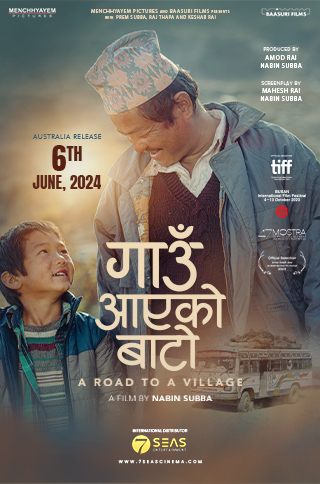Movies
A family in the grip of modernisation
Though subdued, ‘Gaun Aayeko Bato’ manages to evoke a lingering sense of sadness.
Manushree Mahat
In ‘Gaun Aayeko Bato’, the young and troublesome Bindre outrageously commandeers the Coca-Cola bottle like a weapon. As he stands in front of his young friends—‘troops’ as he imagines them to be, he pours the hulking bottle of Coca-Cola directly into their mouths amidst the glaring sunlight like some odd, proud messiah of cold drinks.
Bindre represents a generation colliding with the changing tides of modernisation. He is fascinated by sunglasses, he shouts vroom vroom in his childful glee while his parents are caught up in a serious conversation about their poverty.
He can’t look away from the fizzy, spry Coca-Cola drink being advertised on television, and he runs after the newly unveiled bus that has made its way into their technologically unadvanced village. In young Prasan Rai’s embodiment of Bindre, he is an innocent yet dynamic child who is irrevocably mystified by the qualms of technology and eventually falls victim to it.
This is what Nabin Subba’s directorial comeback entrenches in—simple reality interspersed with tragic metaphors for life in poverty. ‘Gaun Aayeko Bato’ has a quality to it in its intimate, compact cinematography, showing a sandy village mostly uncharted by modernisation.
Its major characters, Maila (Dayahang Rai), Maili (Pashupati Rai), and Bindre (Prasan Rai), a family of three, engage in conversations about their life as the brunt of incoming technology has taken away Maila’s job as a weaver.
For the main characters in ‘Gaun Aayeko Bato’, there is no reprieve from their tragic fate. When a bus arrives at their village, both the soft-spoken Maila and his son are overjoyed with the possibilities it presents.
But Subba, and Mahesh Rai—co-writer of the film—excel in turning these symbols of supposed development into a double-edged sword for the impoverished family. They hop into the bus with the hopes of changing their fate, only to be constantly victimised by it.
In ‘Gaun Aayeko Bato’, the effects of modernisation on indigenous practices, and culturally significant art, and its effect on the economy of families takes centre stage. Maila, a bamboo weaver, is out of job when everybody turns to the new technology.
For his family’s sake, he and Maili resort to making and selling alcohol to the nearby town of Dharan—which is a symposium of modern technology. He travels by bus, time and again, to deliver alcohol, which initially brings him swamps of money.
But again, Subba’s directorial signature here depicts a family victimised by modernity—and so their moments of hard-earned happiness are infinitely too short. The same bus that represents a road towards development, becomes a symbol of shackles, when he is thwarted by the police for illegally selling alcohol.
‘Gaun Aayeko Bato’ is a subdued film. Conversations in the film are marked by hesitative, contemplative silences—its camerawork is gentle, and the actors don’t engage in theatrics. So, when its writing takes an intense turn, and when its actors display raw emotions of anger and sorrow, the effect becomes significantly potent.
Showing restraint while simultaneously emoting raw intensity is what a subdued film like ‘Gaun Aayeko Bato’ demands. And its actors do this well. Here, both Dayahang Rai and Pashupati Rai astutely portray each one’s battered persona fuelled by their frustrating fates.
Dayahang’s acting chops in here is such that you can feel Maila suppressing his emotions at the initial stages of the film, and when he does reveal anger at their doomed fates, his rage stifles you.
This is also true for Pashupati’s Maili, who initially feels one-dimensional. Rightfully angry at their economic condition, she directs all of her anger towards her husband and son. But as the film progresses, so does Maili’s arc, as we see the real her behind this hard-working, angry woman.
In those brief moments of hidden smiles, and display of sorrow at the end of the film, Pashupati’s portrayal of Maili makes her character unforgettable.
‘Gaun Aayeko Bato’ is a film about family, sacrifices, love, and poverty. The only thing I’m on shaky grounds about is the ending. Perhaps Subba’s intention for the abrupt end is purposeful—tragedy doesn’t wait for anybody to show its veracity.
It also seamlessly ties into the metaphor of the bus as a symbol of doom for the family. Perhaps making an immense decision at the end of the film is a powerful way to hone in the message—to show the audience the potency of those who aren’t given the chance to break away from the cycle of poverty.
In its subdued form, ‘Gaun Aayeko Bato’ manages to bring intensity, and a lingering sense of sadness to its audience.
Gaun Aayeko Bato

Director: Nabin Subba
Starring: Dayahang Rai, Pashupati Rai, Prasan Rai
Duration: 1 hour 46 minutes
Language: Nepali
Now showing in cinemas




 20.53°C Kathmandu
20.53°C Kathmandu












